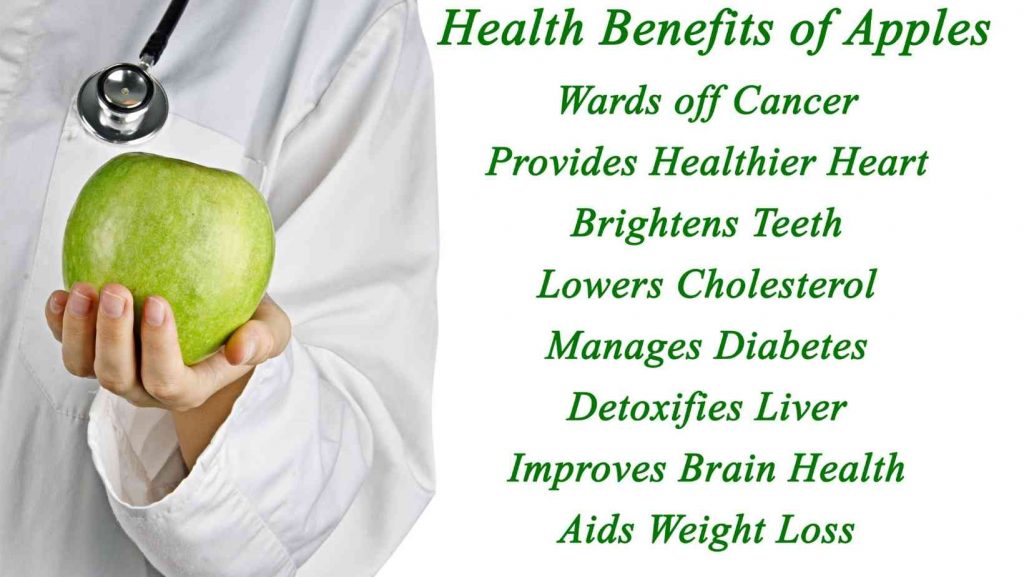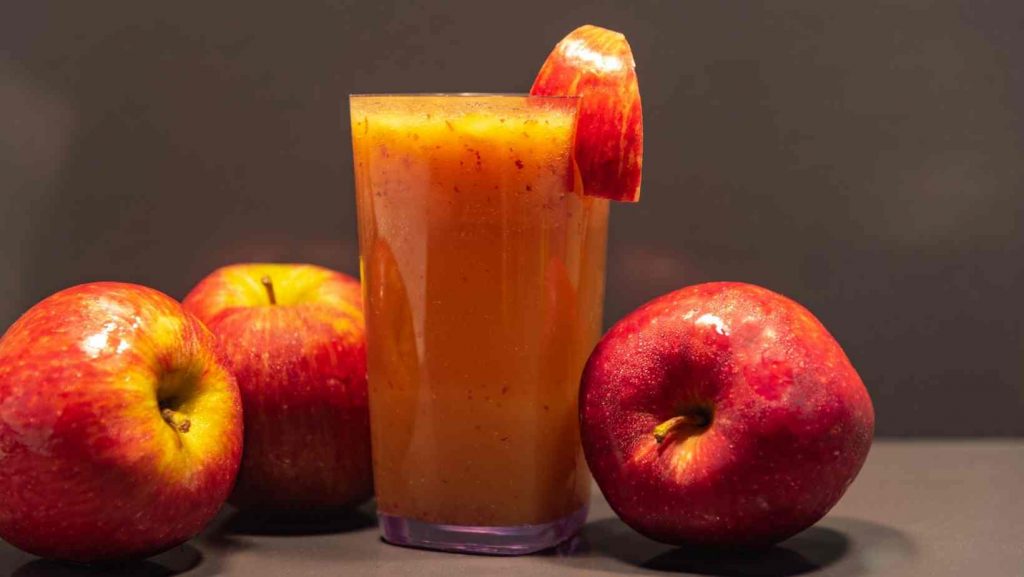Apples aren't only crisp, delicious, and filling; they're also nutritious. They may help protect against major illnesses including heart disease, diabetes, cancer, and more when consumed as part of a healthy diet. Consider them to be your health's best-kept secret.
"An apple a day keeps the doctor away," you've heard a million times. It turns out that this is more true than you would imagine. Apples have been shown in studies to offer significant health advantages, notably in the battle against chronic illnesses, which kill millions of people each year. Here's a quick rundown of how eating more apples may help you stay healthy, as well as several delicious ways to include them in your meals.

Nutritional Values of Apples | Advantages of Eating Apples Every Day
The nutritional value of various apple types varies somewhat, but not much. The following is a nutritional breakdown for one medium apple:
- Calories: 95
- 0 g fat, 0 g protein
- carbs (25 g)
- 195 mg potassium
- 4 g fibre
- 8 mg vitamin C
- 98 IU vitamin A
Apples are high in water (85 percent water) and fibre (a medium apple includes 4 grammes, or approximately 16 percent of your daily intake), both of which help you feel full. Apples have another virtue that makes you feel full: they take time to consume. Foods that you can consume fast tend to leave you hungry, causing you to eat more.
read also: Does Olive Oil Expire?
Apples also have a low glycemic index, which means they don't cause your blood sugar levels to surge. While a blushing Red Delicious or a bright Honeycrisp apple may taste very sweet, your body is capable of processing the sugar in a controlled manner. Snacking on an apple may be a sensible way to react to cravings since apples are both delicious and satisfying. Just be sure you consume the whole fruit, including the skin. Fiber will keep you fuller for longer.
Why Are Apples Healthy For You?
Jump to:
1. It protects your heart
Apples are excellent for your ticker in a variety of ways, according to many researchers. Their high fibre content has been demonstrated to aid in the reduction of cholesterol (lowering bad LDL cholesterol and increasing good HDL cholesterol). Subjects who ate two apples a day for eight weeks had considerably lower LDL cholesterol levels than those who did not consume the fruit, according to a recent small scientific experiment. The fibre in apples, as well as polyphenols, are cited by the researchers—you gain from the complete fruit's nutrients functioning together.

People who ate entire fruits, such as apples, were also less likely to develop high blood pressure, according to a study published by Florida State University. Women who ate apples had a 22 percent lower risk of heart disease throughout a seven-year trial period, according to the Women's Health Study. Finally, because of their high fibre content and a flavonoid called quercetin, eating apples and pears was linked to a 52 percent decreased risk of stroke in Dutch research.
read also: 5 Vegetables That Cannot Be Eaten Uncooked
2. Improves the health of the brain
A collection of four significant pieces of research presented at the Alzheimer's Association's International Conference in 2017 adds to the growing body of data suggesting a plant-based diet may help prevent dementia. Swedish researchers discovered that persons who followed the Nordic Prudent Dietary Pattern (NPDP) had higher cognitive performance than those who ate more fatty, processed foods in one of the trials, which followed 2,000 participants for six years. The NPDP recommends consuming a variety of non-root vegetables, as well as pears, peaches, and-you guessed it-apples.

Another study found that healthy older persons who followed either the Mediterranean or MIND diets, both of which emphasise eating fresh fruits and vegetables, had a 30 to 35 percent decreased risk of dementia. Their cognitive performance improved as they adhered to the regimen for extended periods of time. More study is required, according to experts, but the findings seem to be encouraging.
3. It's possible that it'll assist you in losing weight
Apples may help you fill up for under 100 calories, so it's no surprise that they can help you lose weight. It turns out that the kind of apple you eat makes a difference. People who ate apple slices before a meal felt more full and satisfied than those who ate applesauce, apple juice, or no apples at all, according to one research. In the same research, those who started their meal with apple slices ate 200 fewer calories on average than those who missed the apple slices.

It's also possible that the kind of apple you eat makes a difference. When compared to McIntosh, Golden Delicious, and other popular kinds, one interesting animal research published in Food Chemistry reveals that Granny Smith apples contain fewer carbohydrates and more non-digestible components, including feel-full fibre. The molecules also aid in the feeding of beneficial gut flora, possibly reducing the likelihood of obesity-related issues. Apple prebiotics feeds helpful gut bacteria: recent lab research examined how humans digest the nutrients in entire skin-on apples and discovered an increase in Bifidobacteria, which are beneficial components of our microbiome.
read also: 9 Ways To Check Egg Is Good Or Bad
4. Reduces your chances of developing type 2 diabetes
The figures are self-evident. Tufts researchers found a substantial link between apple consumption and diabetes prevention in a comprehensive evaluation of data, finding that persons who ate one or more apples per day had a 23 percent reduced risk of type 2 diabetes than non-apple eaters. Another research of over 38,000 healthy women found that those who ate one or more apples per day had a 28% reduced risk of type 2 diabetes than those who did not.

In an analysis of data from over 187,000 participants who took part in three long-term studies, Harvard researchers discovered that persons who ate at least two servings of blueberries, grapes, and, yes, apples each week had a 23 percent reduced risk of diabetes than those who ate one serving or less per month. The fibre in the fruit, according to experts, helps to keep blood sugar levels in check. Flavonoids, a kind of antioxidant, have a significant function as well.
read also: 9 Health Benefits Of Dark Chocolate
5. Is a cancer fighter
Apples are towards the top of the list when it comes to cancer-fighting antioxidant activity among fruits (second only to cranberries). Eating an apple a day (or more) has been related to a decreased risk of colorectal, breast, and prostate cancers. Indeed, a review of multiple Italian research indicated that consuming one or more servings of apples per day reduced the risk of colorectal cancer more than any other fruit.

Other human research has shown that eating apples may help prevent lung and prostate cancer. But don't throw away the peel; it contains the majority of the cancer-fighting antioxidants.




